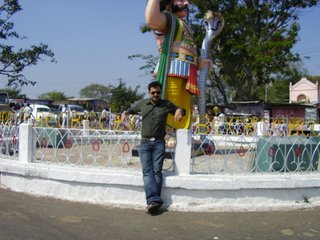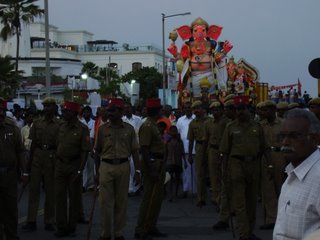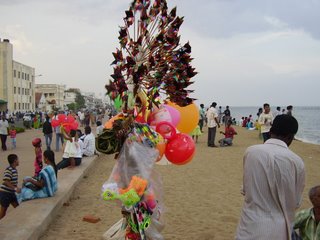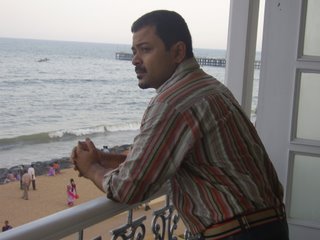Today, October 17, my blog turns a year old. More appropriately, I turn a year old as a blogger. When I had started, Diwali was round the corner. So it is now. I remember about the Diwali because after writing the first few posts, I went home on my annual vacation to Kanpur. And in Kanpur, I would go to a cyber cafe to see if anyone has commented. One night, cuddled inside a quilt in the Kanpur chill, I had a dream: 35 people had commented on a certain post. In the morning I rushed to the cyber cafe: "0 comments".
My first post was about God. It was about things I wanted to say but could not have written in my paper. The next few posts were poems, rather amateurish, reflecting my state of mind at the time: women, women everywhere but not a woman to .....
I am not leaving the space blank so that you can make wild guesses. I have left it blank because I myself did not know why I wanted a woman: To have sex? To be my wife? To be a live-in? To be just a girlfriend? Maybe I was used to having one around all the time, and now the absence of one needled me.
After getting internet connection at home, I had withdrawn myself into a virtual cocoon where emotional and intellectual gratification were unprecedented, but physical gratification was nil: I went to bed alone after making love to online lovers. Life went on like this for one whole year. Occasionally, a flesh-and-blood lotus would sprout, but would remain at the centre of the pond where my arms could not reach. I fantasised about them by writing poems such as Dream and The Kiss. These two poems were written in Kanpur, in a diary borrowed from my father. They were written for a dimpled beauty.
The stay in Kanpur was blanketed in dreams and fantasies and desires. Reality staged a return in Chennai, where the cocktail of loneliness and music made sentences flow night after night, resulting in lengthy posts that stand testimony to the search of a man who didn't quite know what he was searching for. Maybe some attention. That began to trickle in too, gradually, in the form of comments. I can never measure the gratitude I owe to my initial commentators. They had finally ended the drought of "0 comments".
By now, blogging had become an obsession. Whole day I would wait to get back home, pour a drink, recline on the mattress and switch my laptop on. And long after the world had finished its socialising, mine would begin. With a drink in hand, I would begin circulating, striking conversations with beautiful but faceless people, who I knew only by their exotic Yahoo IDs. In between talking to them, I would be writing a post, and occasionally would Ctrl+C and Ctrl+V a few paras to one of them -- just to seek their opinion. Then they would sign off, one after the other, and I would return to finishing my post, lonely as before.
One year of blogging is not a very long journey, considering that there are bloggers who have been around much longer and are more prolific. But my journey has been highly eventful, considering how seamlessly my personal life had weaved into the virtual. No pseudonym, no mask; standing bare in a theatre peopled by stangers. No links to the morning's newspaper reports, no editorialising, no sermonising; just the truest account of my life. If someone cared and showed interest, some of the pain that went into the writing was compensated for.
In journalism they say: You are as good as your last byline. The same is true for blogging. You write every night for months, and your readership steadily climbs up. But you stop for a while, and the readership climbs down as steadily. This happened to me in February this year. I was in peak form as a blogger, stewing in a heady concoction of loneliness, alcohol and music, when Rishikesh beckoned. As I prepared for the Rishikesh trip, mother fell ill. When someone, even if she is only 56, is a heart patient and a diabetic, a trip to the hospital can make you imagine the worst, and I was presently packing, in a great hurry, for Kanpur. Still I took my yoga mat and pants along, just in case circumstances permitted me to travel Rishikesh for the yoga festival.
Mother recovered. Perhaps because I finally made her a promise that must have tempted her to hang on: "Ok, I will get married." And off I went to Rishikesh, with dreams of making out with a Swedish or Danish yoga enthusiast. In between yoga classes, I spoke, on the phone, to my would-be-wife. Sitting on a bench by the furiously-flowing Ganges, I would speak to her for hours. Yet another conquest, I thought. In the end, she conquered me. For once, I did not complain. I was calm, totally peaceful. So peaceful that in the month of March, I wrote only one post, By The Ganges. And for once I had written a post for myself. Most readers, in any case, had stopped coming to my blog because of my long absence.
I had to start all over again. But this time with innocuous, neutral subjects such as pens and, even, Chennai. The readers returned in greater numbers, thanks to Desipundit (the site is now closing down). But you can't ignore your instincts for long, so I wrote about sex too (and I consider this post as one of my best and most honest, if not the best). But the cake was taken by the account of Mani Ratnam's shoot for Guru. The post earned me unprecedented readership and even today, four months later, about a dozen people come to my blog every day to read it.
Today, the readership does not matter so much to me, in the sense that it is no longer a life-and-death question. There was a time when I took my ranking on Indianbloggers very seriously. It varied from no. 10 to no. 25. Occasionally it was no. 40 or 50, and once it even jumped up to no. 3, thanks to the Mani Ratnam post. But the website seems to be down, and I don't really care anymore. What matters to me more now is the luxury to write night after night, especially when I know that it's a luxury I can't afford anymore. I am no longer lonely after all, because I now have a wife. But then, having a wife does not mean your search has ended, especially when don't know what you are searching for.
So what am I trying to say? It's simple: my wife has a smile that is so genuine and cute that every night, I am forced to postpone the search to the night after. And the night after. Meanwhile, out of habit, I happen to write a post apropos of nothing, such as this.
Hey, wait a minute, this post is not for nothing: this is my first-anniversary post, and I got a legitimate reason to write it only because of Atul, who tagged me. Thanks Atul.
Wonder how it will be when I meet Atul and other fellow bloggers. But at the moment, I would like to meet R, my mysterious yet a good friend who had insisted that I start a blog in the first place. R, you listening? I know you are (the smile smiley).











